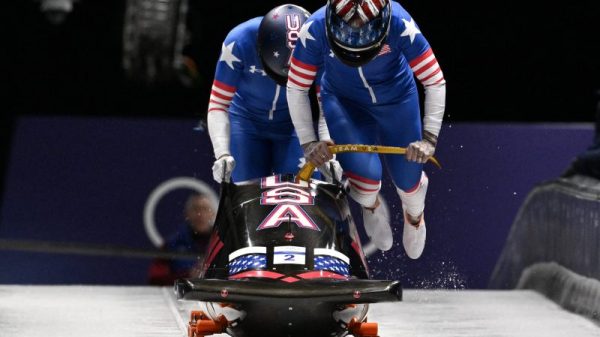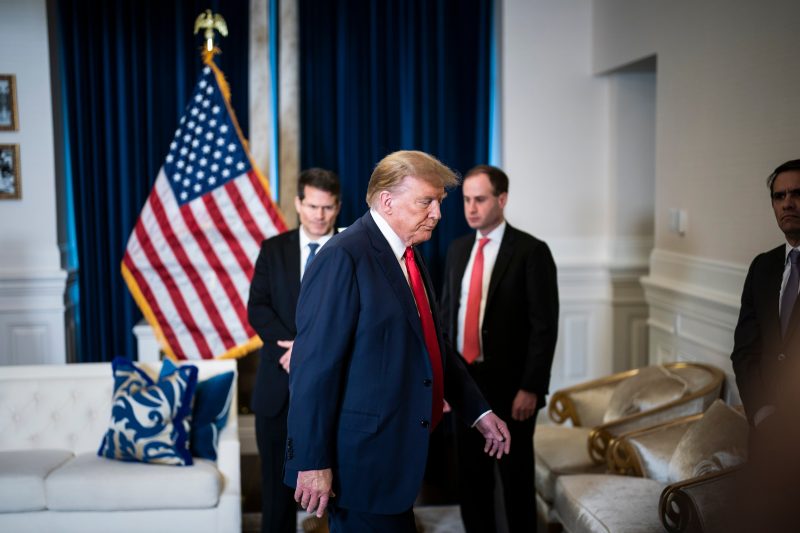Donald Trump often tries to have his legal cake and eat it too.
He has derided the idea that he could be indicted, despite repeatedly pushing for prosecutions of his political rivals. He has baselessly attacked his prosecutions as being the work of President Biden, despite telling Hillary Clinton at a 2016 debate that if he became president “you’d be in jail.” He has labeled it a travesty that judges would take decisions out of voters’ hands by disqualifying him from the ballot, despite repeatedly suggesting that his political opponents should be disqualified.
And as an appeals court took up Trump’s unprecedented claim to presidential immunity from criminal prosecution on Tuesday, the stark, self-serving shifts in Trump’s standards amid his own legal jeopardy got their day in court, too.
The thrust of the argument put forward by Trump attorney D. John Sauer was that a president is immune from prosecution for official acts, unless Congress first impeaches and convicts him.
Judge Florence Y. Pan asked Sauer if that immunity would apply even to a president who orders SEAL Team 6 to assassinate a political rival but isn’t impeached and convicted for it. Sauer strained to avoid a yes-or-no answer but indicated that was indeed his argument — that immunity would apply.
Perhaps the most instructive pushback from the obviously skeptical trio of judges came when Trump’s actual impeachment was broached.
Both Pan and Judge Karen L. Henderson, the one Republican-appointed judge on the panel, suggested that Sauer’s argument flew in the face of how other Trump attorneys sought to beat back his second impeachment, after the Jan. 6, 2021, insurrection.
Indeed, back then the argument was that Trump couldn’t be convicted by the Senate because he was no longer actually president — the trial took place in February 2021 — but that the judicial system was the better venue anyway.
“We have a judicial process in this country; we have an investigative process in this country to which no former officeholder is immune,” Trump attorney David Schoen said at the time. “That is … the appropriate one for investigation, prosecution and punishment, with all of the attributes of that branch.”
Schoen argued that the courts were best prepared to adjudicate such complex legal issues because Congress “does not and cannot offer the safeguards of the judicial system.”
Fellow Trump lawyer Bruce Castor echoed the point at the time even more directly.
“If my colleagues on this [Democratic] side of the chamber actually think that President Trump committed a criminal offense … after he is out of office, you go and arrest him,” Castor said.
Henderson pointed to Trump’s lawyers arguing in another case that the version of immunity they sought then “would expire when the president leaves office” and would not “place the president ‘above the law.’”
A Trump lawyer in that case said that “as the text of the Constitution makes clear, the president like all other citizens is subject to the laws and jurisdiction of states and the federal government alike.”
Just because some Trump lawyers argue one thing and another argues something else doesn’t mean the latter doesn’t have a valid legal argument. Sauer argued that he wasn’t bound by what Trump’s lawyers said previously. (He also gamely sought to differentiate between the judicial system investigating a former president and actually prosecuting him.)
But Pan didn’t just suggest that this evolution was thoroughly convenient; she also suggested it had real consequences.
She posited that Trump might have avoided the impeachment conviction that would supposedly be a prerequisite today precisely because of the argument his lawyers now disown.
“In fact, the argument was there’s no need to vote for impeachment because we have this backstop, which is criminal prosecution,” Pan said, “and it seems that many senators relied on that in voting to acquit.”
Sauer contended it was speculative to surmise why the senators voted how they did. But the top Senate Republican, Mitch McConnell (Ky.), expressly made such a case in announcing his acquittal vote. And a potentially decisive number of GOP senators said they voted to acquit because they argued Trump, as a then-former president, was no longer subject to conviction and removal from office.
In other words, the GOP senators suggested it wasn’t even legally possible to deliver the supposed prerequisite for a criminal prosecution that Trump’s lawyers now contend is necessary. And they did so by adopting his lawyers’ rationale.
As that example shows, such immunity would open up the possibility that a president could do whatever he wanted in his final days in office, with the knowledge that there wouldn’t be sufficient time for Congress to impeach and convict him.
Trump impeachment lawyer Castor, as it happens, directly addressed such a situation back in February 2021.
“So there is no opportunity where the president of the United States can run rampant into January, the end of his term, and just go away scot-free,” Castor said. “The Department of Justice does know what to do with such people.”
Trump’s new lawyer now effectively argues that what the Justice Department can do with such people is effectively this: nothing.



























